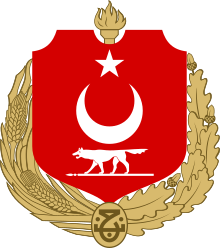This is an old revision of this page, as edited by Sjö (talk | contribs) at 13:46, 10 December 2024 (Reverted edit by Manolya Aşık (talk) to last version by 2A02:A310:C0A5:C700:7CEC:2A8F:DE49:9FD2). The present address (URL) is a permanent link to this revision, which may differ significantly from the current revision.
Revision as of 13:46, 10 December 2024 by Sjö (talk | contribs) (Reverted edit by Manolya Aşık (talk) to last version by 2A02:A310:C0A5:C700:7CEC:2A8F:DE49:9FD2)(diff) ← Previous revision | Latest revision (diff) | Newer revision → (diff) She-wolf in the Gokturk foundation myth This article is about Asena in Turkic mythology. For other uses, see Asena (disambiguation).
Asena is the name of a she-wolf associated with the Gokturk foundation myth. The ancestress of the Göktürks is a she-wolf, mentioned yet unnamed in two different "Wolf Tales". The legend of Asena tells of a young boy who survived a battle; a female wolf finds the injured child and nurses him back to health. The she-wolf, impregnated by the boy, escapes her enemies by crossing the Western Sea to a cave near the Qocho mountains and a city of the Tocharians, giving birth to ten half-wolf, half-human boys. Of these, Yizhi Nishidu becomes their leader and establishes the Ashina clan, which ruled over the Göktürk and other Turkic nomadic empires.
In certain cultural narratives and mythological accounts, the character of Asena, with its symbolic association to a she-wolf, is denoted by the name "Bozkurt" (meaning Gray Wolf in Turkish), embodying a significant archetype with multifaceted connotations.
Modern era
With the rise of Turkish ethnic nationalism in the 1930s, the veneration of figures of Turkic Mythology, such as Bozkurt, Asena and Ergenekon was resurgent.
The Turkish Air Force's Boeing KC-135 Stratotanker tanker squadron is nicknamed ''Asena''.
Leader of the Turkish nationalist İYİ Parti Meral Akşener is nicknamed Asena.
See also
- List of wolves
- Grey wolf (mythology)
- Tiele people, whose progenitors were a gray he-wolf and a Xiongnu princess
- She-wolf (Roman mythology), a similar figure in the mythical foundation of Rome
- Romulus and Remus
References
- Ziya Gökalp, transcription: Şahin Filiz, "Türk devletinin tekâmülü 12: Hakanlık Teşkilatı",Küçük Mecmua -II-, Bu da Çinlilere göre (Asena=Kurt) manasındadır (in Turkish)
- Golden, Peter B. (August 2018). "The Ethnogonic Tales of the Türks" in The Medieval History Journal, 21(2). 21 (2): 291–327
- Hongen, Niu; 牛鴻恩 (2015). Xin yi Yi Zhou shu. 袁宏. (Di 1 ban ed.). Taibei Shi: 三民書局. ISBN 9789571460192. OCLC 913445355.
- Findley, Carter Vaughin. The Turks in World History. Oxford University Press, 2005. ISBN 0-19-517726-6. Page 38.
- Roxburgh, D. J. (ed.) Turks, A Journey of a Thousand Years. Royal Academy of Arts, London, 2005. Page 20.
- Koto, Koray (2023-07-21). "Börü: The Wolf in Turkic Mythology". ULUKAYIN English. Retrieved 2023-07-24.
- "A challenge to Turkey's Erdogan". The Economist. 16 November 2017. Retrieved 17 November 2017.
| Göktürks | |
|---|---|
| First Turkic Khaganate (552–581) |
|
| Eastern Turkic Khaganate (581–630) | |
| Western Turkic Khaganate (581–657) | |
| Second Turkic Khaganate (682–744) | |
| Western Turks under Jimi system |
|
| Göktürk culture | |
| Göktürk wars and battles | |
| Titles | |
| Family | |